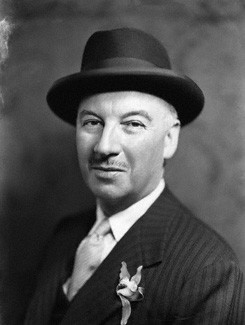Lord Berners facts for kids
Lord Berners (born Gerald Hugh Tyrwhitt-Wilson; 18 September 1883 – 19 April 1950) was a talented British artist. He was a composer, writer, and painter. He was also known as Gerald Tyrwhitt.
Contents
Biography
Early life and education
Gerald Hugh Tyrwhitt was born in Apley Hall, Stockton, Shropshire, in 1883. His father was a Royal Navy officer who was often away. Gerald was raised by his grandmother and mother. His mother was interested in fox hunting and wanted him to be more "manly," but he was more interested in music.
Berners went to Cheam School and Eton College. Later, he studied in France and Germany. He tried to join the Foreign Office but did not pass the exams. Instead, he worked as an honorary attache (a type of diplomat) in Constantinople from 1909 to 1911. He then worked in Rome until 1918.
Adult life
In 1918, Berners became the 14th Baron Berners. He inherited the title, property, and money from an uncle. This included Faringdon House in Faringdon, Oxfordshire. He first let his mother and her second husband live there. After they passed away in 1931, he moved into the house himself.
In 1932, a younger man named Robert Heber-Percy became his close companion. Robert moved into Faringdon House.
Lord Berners was a skilled artist and writer, as well as a musician. He is mentioned in many books from that time. For example, he appears as Lord Merlin in Nancy Mitford's book The Pursuit of Love. He was also a friend of the famous Mitford family.
Berners was known for his unique and playful personality. He once dyed the pigeons at his Faringdon home in bright colors. He also enjoyed playing pranks, like driving around his estate wearing a pig's-head mask. Inside his house, he had funny signs, like "Mangling Done Here."
Many famous people visited Faringdon House. These included the composers Igor Stravinsky and Salvador Dalí, and the writer H. G. Wells. His Rolls-Royce car even had a small keyboard that could be stored under the front seat.
During World War II, he went through a difficult period and had a nervous breakdown. He lived in Oxford for a while and helped catalog books. After his last ballet, Les Sirènes (1946), he lost his eyesight.
Death and epitaph
Lord Berners passed away in 1950 at Faringdon House when he was 66 years old. He left his estate to Robert Heber-Percy, who lived there until 1987. Berners' ashes are buried in the lawn near the house.
He wrote his own epitaph (a short text on a gravestone), which reads:
- Here lies Lord Berners
- One of the learners
- His great love of learning
- May earn him a burning
- But, Praise the Lord!
- He seldom was bored.
Music
Berners' early music was written while he was working at the British embassy in Rome during World War I. These pieces were quite modern for their time. They were mostly songs (in English, French, and German) and piano pieces. Many of these were written under his original name, Gerald Tyrwhitt.
Later, his music became easier to listen to. Some of his well-known pieces include Fantaisie espagnole (1919) and Fugue in C minor (1924). He also composed several ballets (musical stories told through dance). These include The Triumph of Neptune (1926) and Luna Park (1930). His last three ballets, A Wedding Bouquet, Cupid and Psyche, and Les Sirènes, were created with his friends Frederick Ashton (a choreographer) and Constant Lambert (a music director).
Berners was also friends with composer William Walton. Walton dedicated his famous work Belshazzar's Feast to Berners. Berners also wrote music for two films: The Halfway House (1943) and Nicholas Nickleby (1947).
Berners once joked that he would have been a better composer if he had accepted fewer lunch invitations. However, some experts believe that his unique, playful style came from his diverse interests. Composer Gavin Bryars said that if Berners had spent more time on music, he might have become a "duller composer."
Lord Berners was featured on BBC Radio 3's "Composer of the Week" program in December 2014.
Literature
Berners wrote four books about his own life and several novels. Most of his novels were humorous. All his books were published, and some were even translated into other languages. His autobiographies, like First Childhood (1934) and A Distant Prospect (1945), are known for being witty and warm.
Berners also wrote a humorous novel called The Girls of Radcliff Hall. This book was a funny satire that imagined him and his friends as students at a girls' school. It was published privately and became popular in the 1930s.
His other novels, such as Romance of a Nose and Count Omega, combine fantasy with gentle humor.
Legacy
In January 2016, actor Christopher Godwin played Lord Berners in an episode of the BBC Radio 4 drama What England Owes.
See also
- Lord Berners profiled in Loved Ones, a book of pen portraits by close friend Diana Mitford.
 | Selma Burke |
 | Pauline Powell Burns |
 | Frederick J. Brown |
 | Robert Blackburn |


